初中英语--so的用法及意思总结大全
- 格式:docx
- 大小:18.59 KB
- 文档页数:3
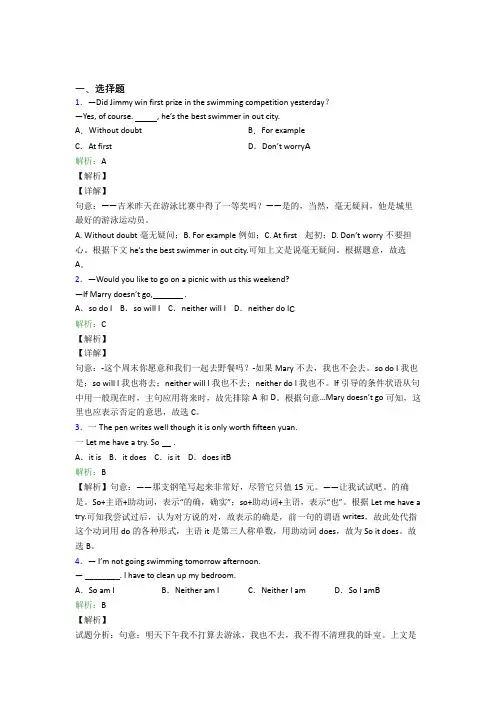
一、选择题1.—Did Jimmy win first prize in the swimming competition yesterday?—Yes, of course. , he’s the best swimmer in out city.A.Without doubt B.For exampleC.At first D.Don’t worry A解析:A【解析】【详解】句意:——吉米昨天在游泳比赛中得了一等奖吗?——是的,当然,毫无疑问,他是城里最好的游泳运动员。
A. Without doubt毫无疑问;B. For example例如;C. At first 起初;D. Don’t worry不要担心。
根据下文he’s the best swimmer in out city.可知上文是说毫无疑问。
根据题意,故选A。
2.—Would you like to go on a picnic with us this weekend?—If Marry doesn’t go, .A.so do I B.so will I C.neither will I D.neither do I C解析:C【解析】【详解】句意:-这个周末你愿意和我们一起去野餐吗?-如果Mary不去,我也不会去。
so do I我也是;so will I我也将去;neither will I我也不去;neither do I 我也不。
If引导的条件状语从句中用一般现在时,主句应用将来时,故先排除A和D。
根据句意…Mary doesn’t go可知,这里也应表示否定的意思,故选C。
3.一The pen writes well though it is only worth fifteen yuan.一Let me have a try. So .A.it is B.it does C.is it D.does it B解析:B【解析】句意:——那支钢笔写起来非常好,尽管它只值15元。
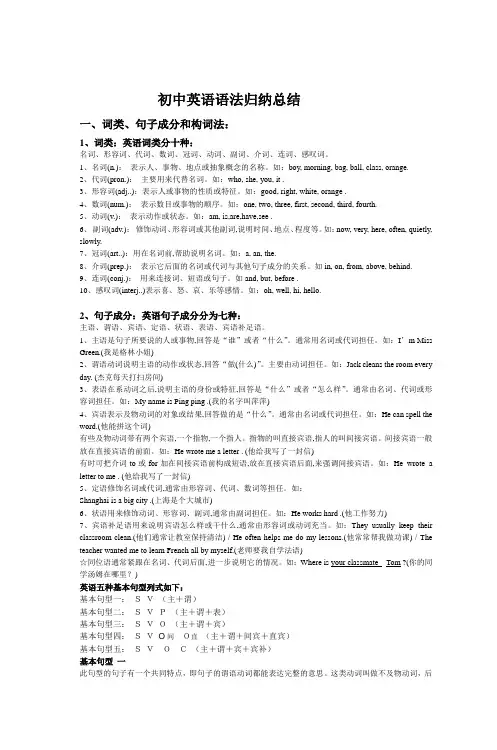
初中英语语法归纳总结一、词类、句子成分和构词法:1、词类:英语词类分十种:名词、形容词、代词、数词、冠词、动词、副词、介词、连词、感叹词。
1、名词(n.):表示人、事物、地点或抽象概念的名称。
如:boy, morning, bag, ball, class, orange.2、代词(pron.):主要用来代替名词。
如:who, she, you, it .3、形容词(adj..):表示人或事物的性质或特征。
如:good, right, white, orange .4、数词(num.):表示数目或事物的顺序。
如:one, two, three, first, second, third, fourth.5、动词(v.):表示动作或状态。
如:am, is,are,have,see .6、副词(adv.):修饰动词、形容词或其他副词,说明时间、地点、程度等。
如:now, very, here, often, quietly, slowly.7、冠词(art..):用在名词前,帮助说明名词。
如:a, an, the.8、介词(prep.):表示它后面的名词或代词与其他句子成分的关系。
如in, on, from, above, behind.9、连词(conj.):用来连接词、短语或句子。
如and, but, before .10、感叹词(interj..)表示喜、怒、哀、乐等感情。
如:oh, well, hi, hello.2、句子成分:英语句子成分分为七种:主语、谓语、宾语、定语、状语、表语、宾语补足语。
1、主语是句子所要说的人或事物,回答是“谁”或者“什么”。
通常用名词或代词担任。
如:I’m Miss Green.(我是格林小姐)2、谓语动词说明主语的动作或状态,回答“做(什么)”。
主要由动词担任。
如:Jack cleans the room every day. (杰克每天打扫房间)3、表语在系动词之后,说明主语的身份或特征,回答是“什么”或者“怎么样”。
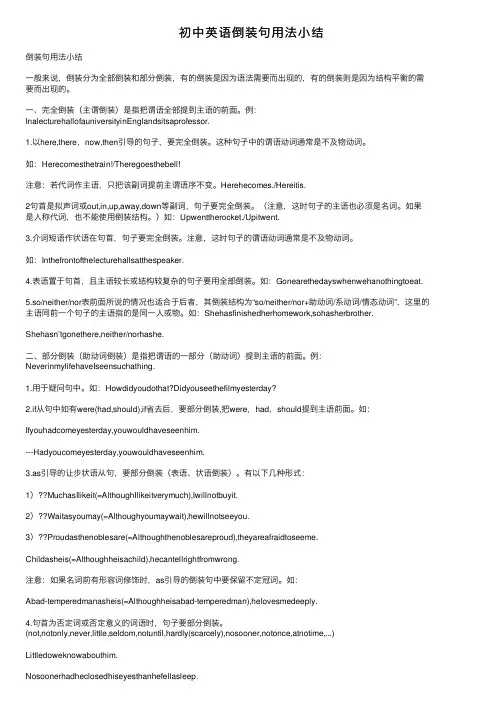
初中英语倒装句⽤法⼩结倒装句⽤法⼩结⼀般来说,倒装分为全部倒装和部分倒装,有的倒装是因为语法需要⽽出现的,有的倒装则是因为结构平衡的需要⽽出现的。
⼀、完全倒装(主谓倒装)是指把谓语全部提到主语的前⾯。
例:InalecturehallofauniversityinEnglandsitsaprofessor.1.以here,there,now,then引导的句⼦,要完全倒装。
这种句⼦中的谓语动词通常是不及物动词。
如:Herecomesthetrain!/Theregoesthebell!注意:若代词作主语,只把该副词提前主谓语序不变。
Herehecomes./Hereitis.2句⾸是拟声词或out,in,up,away,down等副词,句⼦要完全倒装。
(注意,这时句⼦的主语也必须是名词。
如果是⼈称代词,也不能使⽤倒装结构。
)如:Upwenttherocket./Upitwent.3.介词短语作状语在句⾸,句⼦要完全倒装。
注意,这时句⼦的谓语动词通常是不及物动词。
如:Inthefrontofthelecturehallsatthespeaker.4.表语置于句⾸,且主语较长或结构较复杂的句⼦要⽤全部倒装。
如:Gonearethedayswhenwehanothingtoeat.5.so/neither/nor表前⾯所说的情况也适合于后者,其倒装结构为“so/neither/nor+助动词/系动词/情态动词”,这⾥的主语同前⼀个句⼦的主语指的是同⼀⼈或物。
如:Shehasfinishedherhomework,sohasherbrother.Shehasn’tgonethere,neither/norhashe.⼆、部分倒装(助动词倒装)是指把谓语的⼀部分(助动词)提到主语的前⾯。
例:NeverinmylifehaveIseensuchathing.1.⽤于疑问句中。
如:Howdidyoudothat?Didyouseethefilmyesterday?2.if从句中如有were(had,should),if省去后,要部分倒装,把were,had,should提到主语前⾯。
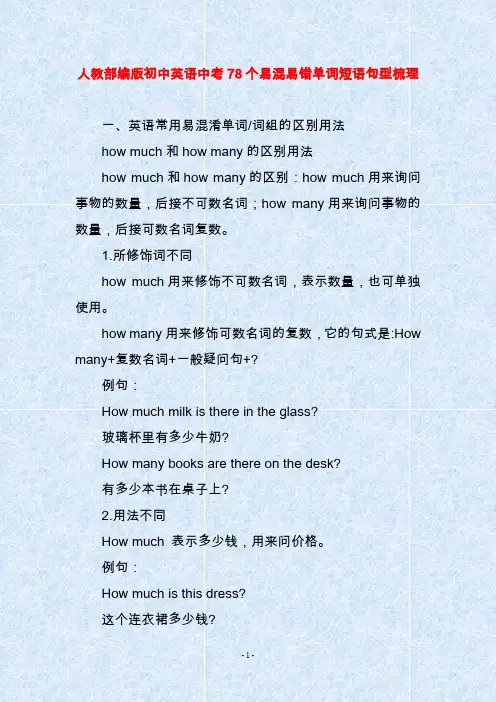
人教部编版初中英语中考78个易混易错单词短语句型梳理一、英语常用易混淆单词/词组的区别用法how much和how many的区别用法how much和how many的区别:how much用来询问事物的数量,后接不可数名词;how many用来询问事物的数量,后接可数名词复数。
1.所修饰词不同how much用来修饰不可数名词,表示数量,也可单独使用。
how many用来修饰可数名词的复数,它的句式是:How many+复数名词+一般疑问句+?例句:How much milk is there in the glass?玻璃杯里有多少牛奶?How many books are there on the desk?有多少本书在桌子上?2.用法不同How much 表示多少钱,用来问价格。
例句:How much is this dress?这个连衣裙多少钱?How many 表示多少,用来问数量。
例句:How many apples do you have?你有多少苹果?in和on的区别用法当我们表示某些东西被其他东西所包围时使用“in”这个词。
而“on”用于描述物体被放置在其他物体上方或外部的情况。
in可表时间,表地点,表手段、方法、材料。
on表示时间、地点、方位等。
1.意思不同in:prep.在 ... 里;在 ... 地方;在 ... 期间on:prep.在 ... 之上2.用法不同in:in着重一段时间的过程,常用于重复动作或延续动作。
in表示从现在时间算起推移到将来的一段时间之后,一般与将来时态连用。
例句:He is a layman in economics.他对经济学一窍不通。
on:表示“在物体的表面上”,只能用on的表达方式有on the next morning,on the following。
例句:The spider is walking on the ceiling.蜘蛛在天花板上爬行。
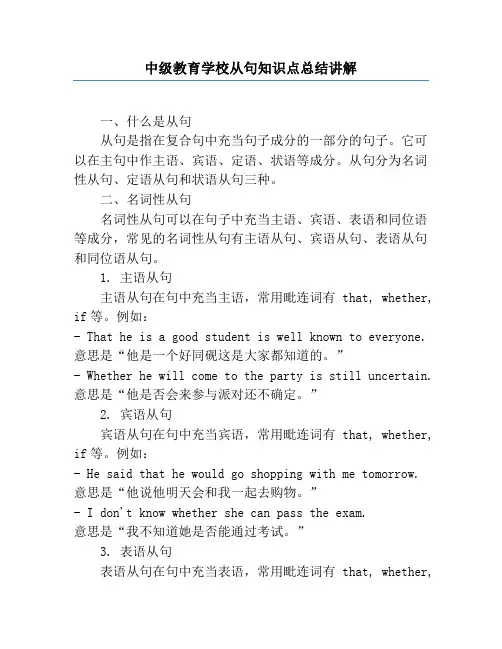
中级教育学校从句知识点总结讲解一、什么是从句从句是指在复合句中充当句子成分的一部分的句子。
它可以在主句中作主语、宾语、定语、状语等成分。
从句分为名词性从句、定语从句和状语从句三种。
二、名词性从句名词性从句可以在句子中充当主语、宾语、表语和同位语等成分,常见的名词性从句有主语从句、宾语从句、表语从句和同位语从句。
1. 主语从句主语从句在句中充当主语,常用毗连词有that, whether, if等。
例如:- That he is a good student is well known to everyone. 意思是“他是一个好同砚这是大家都知道的。
”- Whether he will come to the party is still uncertain. 意思是“他是否会来参与派对还不确定。
”2. 宾语从句宾语从句在句中充当宾语,常用毗连词有that, whether, if等。
例如:- He said that he would go shopping with me tomorrow. 意思是“他说他明天会和我一起去购物。
”- I don't know whether she can pass the exam.意思是“我不知道她是否能通过考试。
”3. 表语从句表语从句在句中充当表语,常用毗连词有that, whether,if等。
例如:- The fact is that he is a liar.意思是“事实是他是一个说谎者。
”- My concern is whether we can finish the project on time.意思是“我关注的是我们是否能按时完成项目。
”4. 同位语从句同位语从句在句中充当同位语,常用毗连词有that, whether, if等。
例如:- The news that he got the first prize made me happy. 意思是“他获得第一名的消息让我很兴奋。
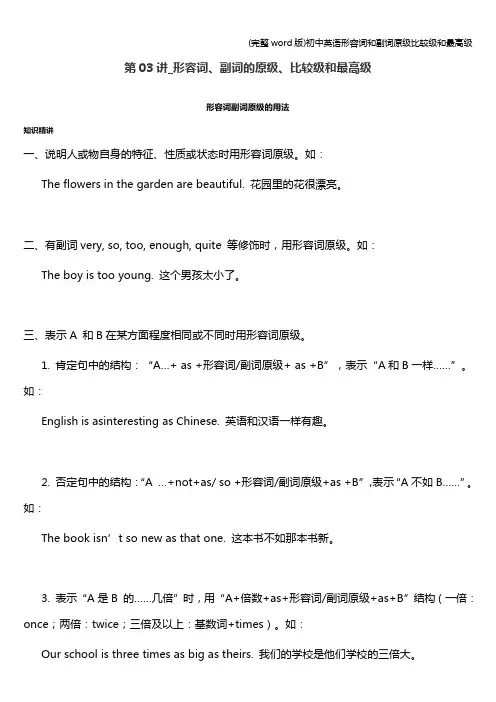
形容词副词原级的用法知识精讲一、说明人或物自身的特征、性质或状态时用形容词原级。
如:The flowers in the garden are beautiful. 花园里的花很漂亮。
二、有副词very, so, too, enough, quite 等修饰时,用形容词原级。
如:The boy is too young. 这个男孩太小了。
三、表示A 和B在某方面程度相同或不同时用形容词原级。
1. 肯定句中的结构:“A…+ as +形容词/副词原级+ as +B”,表示“A和B一样……”。
如:English is asinteresting as Chinese. 英语和汉语一样有趣。
2. 否定句中的结构:“A …+not+as/ so +形容词/副词原级+as +B”,表示“A不如B……”。
如:The book isn’t so new as that one. 这本书不如那本书新。
3. 表示“A是B 的……几倍”时,用“A+倍数+as+形容词/副词原级+as+B”结构(一倍:once;两倍:twice;三倍及以上:基数词+times)。
如:Our school is three times as big as theirs. 我们的学校是他们学校的三倍大。
一、考点:形容词副词不同级别用法的考查较为重要,同学们在学习中要注意辨别不同级别的使用。
二、补充点:否定句的结构中部分双音节和多音节形容词除使用“not …as/ so +形容词/副词原级+ as”结构外,还可使用“less+形容词/副词原级+than”结构。
如:He thinks Chinese is not as interesting as English.= He thinks Chinese is less interesting than English.他认为汉语不如英语有趣。
题模精讲题模一形容词副词原级的用法例1.1、Kate said that she didn’t feel very _________ today.A、gooderB、goodC、niceD、better例1.2、用形容词的适当形式填空。
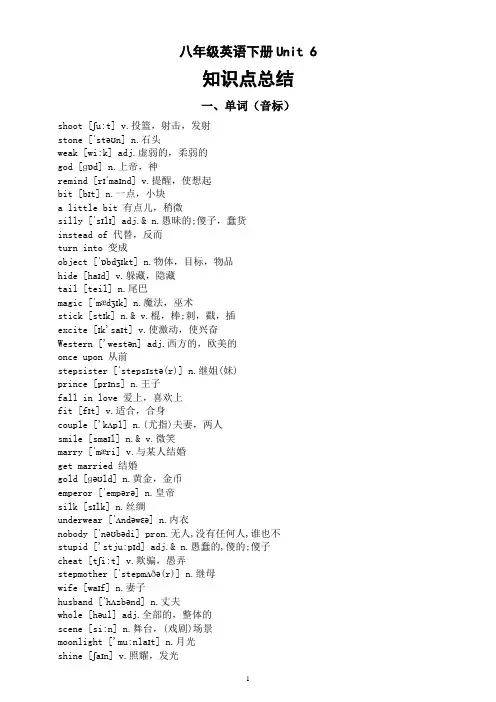
八年级英语下册Unit 6知识点总结一、单词(音标)shoot [ʃu:t] v.投篮,射击,发射stone [ˈstəʊn] n.石头weak [wi:k] adj.虚弱的,柔弱的god [ɡɒd] n.上帝,神remind [rɪˈmaɪnd] v.提醒,使想起bit [bɪt] n.一点,小块a little bit 有点儿,稍微silly [ˈsɪlɪ] adj.& n.愚昧的;傻子,蠢货instead of 代替,反而turn into 变成object [ˈɒbdʒɪkt] n.物体,目标,物品hide [haɪd] v.躲藏,隐藏tail [teil] n.尾巴magic [ˈmædʒɪk] n.魔法,巫术stick [stɪk] n.& v.棍,棒;刺,戳,插excite [ɪk'saɪt] v.使激动,使兴奋Western ['westən] adj.西方的,欧美的once upon 从前stepsister [ˈstepsɪstə(r)] n.继姐(妹)prince [prɪns] n.王子fall in love 爱上,喜欢上fit [fɪt] v.适合,合身couple ['kʌpl] n.(尤指)夫妻,两人smile [smaɪl] n.& v.微笑marry [ˈmæri] v.与某人结婚get married 结婚gold [ɡəʊld] n.黄金,金币emperor [ˈempərə] n.皇帝silk [sɪlk] n.丝绸underwear [ˈʌndəwɛə] n.内衣nobody [ˈnəʊbədi] pron.无人,没有任何人,谁也不stupid ['stju:pɪd] adj.& n.愚蠢的,傻的;傻子cheat [tʃi:t] v.欺骗,愚弄stepmother [ˈstepmʌðə(r)] n.继母wife [waɪf] n.妻子husband [ˈhʌzbənd] n.丈夫whole [həul] adj.全部的,整体的scene [si:n] n.舞台,(戏剧)场景moonlight ['mu:nlaɪt] n.月光shine [ʃaɪn] v.照耀,发光bright [braɪt] adj.& adv.明亮的,发亮的;明亮地ground [graʊnd] n.地面lead [li:d] n.& v.领导,主角;带路voice [vɔis] n.嗓音brave [breiv] adj.勇敢的Claudia 克劳迪娅(女名)Journey to the West 《西游记》the Monkey King 美猴王Sleeping Beauty 《睡美人》Cinderella 《灰姑娘》Little Red Riding Hood 《小红帽》Hansel and Gretel 《韩赛尔与格雷特》(《糖果屋》)二、重点短语1.work on doing sth.致力于做某事2.as soon as ... 一……就…....3.once upon a time 从前4.continue to do sth.继续做某事5.make sth.happen 使某事发生6.try to do sth.努力做某事7.the journey to sp.......之旅8.tell the/a story 讲故事9.put on 穿10.a little bit 有点儿11.keep doing sth.坚持做某事12.give up 放弃13.instead of 代替;反而14.turn...into...使......变成......15.get married 结婚16.the main character 主要人物;主人公17.at other times 在另外一些时候18.be able to 能;会e out (书、电影等)出版20.become interested in...对……感兴趣21.walk to the other side 走到另一边去22.a fairy tale 一个神话故事23.the rest of the story 故事的其余部分24.leave sb.to do sth.让某人做某事25.make a plan to do sth.筹划/计划做某事26.go to sleep 去睡觉27.lead sb.to sp.把某人领到某地28.get lost 迷路29.change one’s plan 改变计划30.tell sb.to do sth.叫某人做某事31.in the moonlight 在月光下32.find one’ s way home 找到某人回家的路33.the next day 第二天34.send sb.to sp.派某人去某地35.so...that...如此.......以致于.......三、重点句型1.So what do you think about the story of Yu Gong? 你觉得愚公的故事怎么样?2.It doesn't seem very possible to move a mountain.把一座山给移掉好像不太可能。
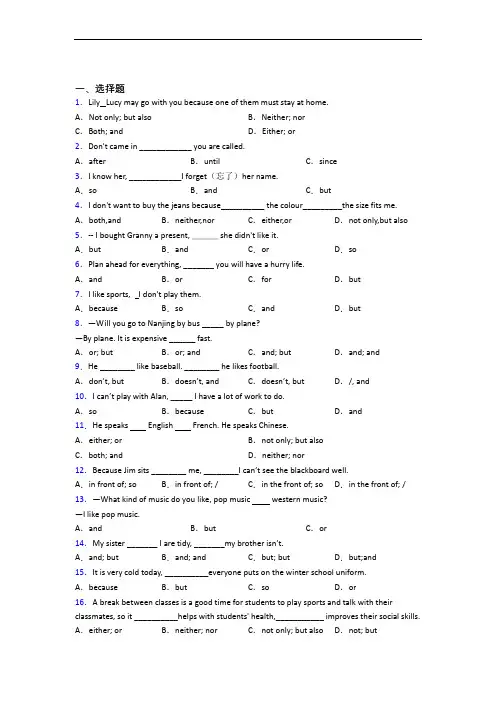
一、选择题1.Lily Lucy may go with you because one of them must stay at home.A.Not only; but also B.Neither; norC.Both; and D.Either; or2.Don't came in ____________ you are called.A.after B.until C.since3.I know her, ____________I forget(忘了)her name.A.so B.and C.but4.I don't want to buy the jeans because__________ the colour_________the size fits me. A.both,and B.neither,nor C.either,or D.not only,but also 5.-- I bought Granny a present, ___ she didn't like it.A.but B.and C.or D.so6.Plan ahead for everything, _______ you will have a hurry life.A.and B.or C.for D.but7.I like sports, I don't play them.A.because B.so C.and D.but8.—Will you go to Nanjing by bus _____ by plane?—By plane. It is expensive ______ fast.A.or; but B.or; and C.and; but D.and; and9.He ________ like baseball. ________ he likes football.A.don’t, but B.doesn’t, and C.doesn’t, but D./, and10.I can’t play with Alan, _____ I have a lot of work to do.A.so B.because C.but D.and11.He speaks English French. He speaks Chinese.A.either; or B.not only; but alsoC.both; and D.neither; nor12.Because Jim sits ________ me, ________I can’t see the blackboard well.A.in front of; so B.in front of; / C.in the front of; so D.in the front of; / 13.—What kind of music do you like, pop music western music?—I like pop music.A.and B.but C.or14.My sister _______ I are tidy, _______my brother isn’t.A.and; but B.and; and C.but; but D.but;and15.It is very cold today, __________everyone puts on the winter school uniform. A.because B.but C.so D.or16.A break between classes is a good time for students to play sports and talk with their classmates, so it __________helps with students' health,___________ improves their social skills. A.either; or B.neither; nor C.not only; but also D.not; but17._________ John ____________ Frank passed the examination. They felt very upset. A.Either; or B.Not only; but also C.Neither; nor18.______ Lily ______ I will go to watch the film because one of us must be at home and look after the grandma.A.Either, or B.Both, andC.Neither, nor D.Not only, but also19.— What kinds of fruit do you like eating?—Apples as well as oranges.A.and B.but C.or20.I like chocolate, ________ I don't eat a lot.A.and B.but C.because D.or21.It was raining hard, ________they had to stay at home.A.but B.or C.so D.because22.The books are in the bookcase ______ the hat is in it, too.A.but B.or C.and D.because【参考答案】***试卷处理标记,请不要删除一、选择题1.D解析:D【解析】【详解】此题重点考查四个短语的含义及其基本用法。
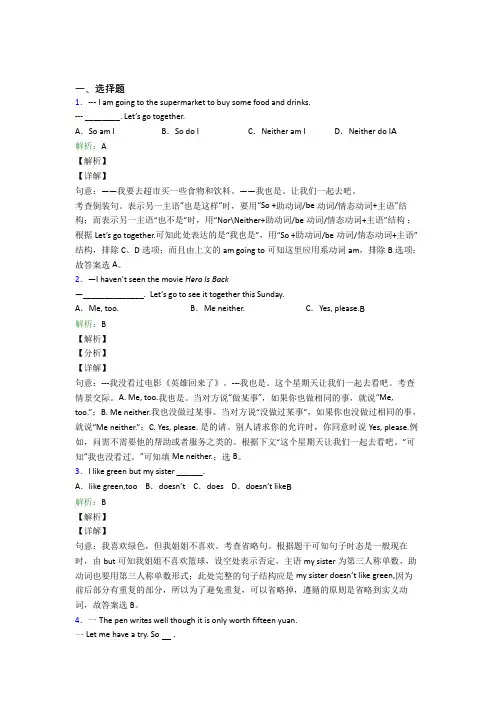
一、选择题1.--- I am going to the supermarket to buy some food and drinks.--- ________. Let’s go together.A.So am I B.So do I C.Neither am I D.Neither do I A解析:A【解析】【详解】句意:——我要去超市买一些食物和饮料。
——我也是。
让我们一起去吧。
考查倒装句。
表示另一主语“也是这样”时,要用“So +助动词/be动词/情态动词+主语”结构;而表示另一主语“也不是”时,用“Nor\Neither+助动词/be动词/情态动词+主语”结构;根据Let’s go together.可知此处表达的是“我也是”,用“So +助动词/be动词/情态动词+主语”结构,排除C、D选项;而且由上文的am going to可知这里应用系动词am,排除B选项;故答案选A。
2.—I haven’t seen the movie Hero Is Back—______________. Let’s go to see it together this Sunday.A.Me, too. B.Me neither. C.Yes, please.B解析:B【解析】【分析】【详解】句意:---我没看过电影《英雄回来了》。
---我也是。
这个星期天让我们一起去看吧。
考查情景交际。
A. Me, too.我也是。
当对方说“做某事”,如果你也做相同的事,就说“Me, too.”;B. Me neither.我也没做过某事。
当对方说“没做过某事”,如果你也没做过相同的事,就说“Me neither.”;C. Yes, please. 是的请。
别人请求你的允许时,你同意时说Yes, please.例如,问需不需要他的帮助或者服务之类的。
根据下文“这个星期天让我们一起去看吧。
”可知“我也没看过。
”可知填Me neither.;选B。
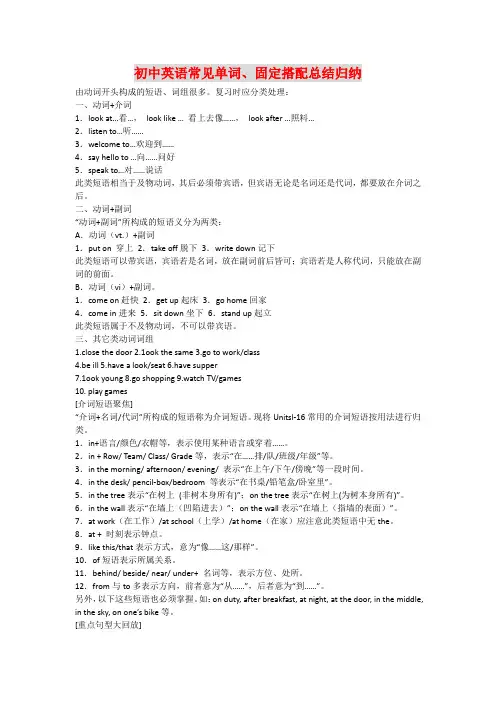
初中英语常见单词、固定搭配总结归纳由动词开头构成的短语、词组很多。
复习时应分类处理:一、动词+介词1.look at…看…,look like … 看上去像……,look after …照料…2.listen to…听……3.welcome to…欢迎到……4.say hello to …向……问好5.speak to…对……说话此类短语相当于及物动词,其后必须带宾语,但宾语无论是名词还是代词,都要放在介词之后。
二、动词+副词“动词+副词”所构成的短语义分为两类:A.动词(vt.)+副词1.put on 穿上2.take off脱下3.write down记下此类短语可以带宾语,宾语若是名词,放在副词前后皆可;宾语若是人称代词,只能放在副词的前面。
B.动词(vi)+副词。
1.come on赶快2.get up起床3.go home回家4.come in进来5.sit down坐下6.stand up起立此类短语属于不及物动词,不可以带宾语。
三、其它类动词词组1.close the door2.1ook the same3.go to work/class4.be ill5.have a look/seat6.have supper7.1ook young 8.go shopping 9.watch TV/games10. play games[介词短语聚焦]“介词+名词/代词”所构成的短语称为介词短语。
现将Unitsl-16常用的介词短语按用法进行归类。
1.in+语言/颜色/衣帽等,表示使用某种语言或穿着……。
2.in + Row/ Team/ Class/ Grade等,表示“在……排/队/班级/年级”等。
3.in the morning/ afternoon/ evening/ 表示“在上午/下午/傍晚”等一段时间。
4.in the desk/ pencil-box/bedroom 等表示“在书桌/铅笔盒/卧室里”。
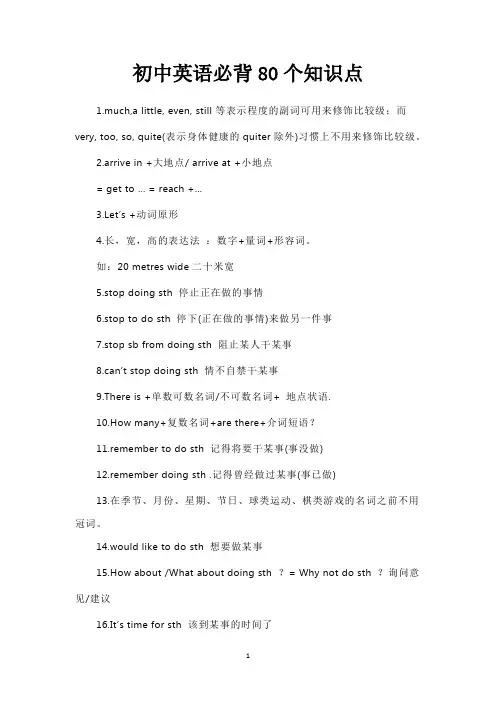
初中英语必背80个知识点1.much,a little, even, still等表示程度的副词可用来修饰比较级;而very, too, so, quite(表示身体健康的quiter除外)习惯上不用来修饰比较级。
2.arrive in +大地点/ arrive at +小地点= get to … = reach +…3.Let’s +动词原形4.长,宽,高的表达法:数字+量词+形容词。
如:20 metres wide二十米宽5.stop doing sth 停止正在做的事情6.stop to do sth 停下(正在做的事情)来做另一件事7.stop sb from doing sth 阻止某人干某事8.can’t stop doing sth 情不自禁干某事9.There is +单数可数名词/不可数名词+ 地点状语.10.How many+复数名词+are there+介词短语?11.remember to do sth 记得将要干某事(事没做)12.remember doing sth .记得曾经做过某事(事已做)13.在季节、月份、星期、节日、球类运动、棋类游戏的名词之前不用冠词。
14.would like to do sth 想要做某事15.How about /What about doing sth ?= Why not do sth ?询问意见/建议16.It’s time for sth 该到某事的时间了17.It’s time to do sth该到干某事的时间了18.have fun doing sth 很高兴干某事19.make sb do sth 使某人干某事20.can’t afford to do sth 没有足够多钱干某事21.can’t stand doing sth 不能忍受干某事22.mind doing sth 介意干某事23.try to do sth 尽力干某事24.finish doing sth 结束干某事25.decide to do sth 决定干某事26.plan to do sth 计划干某事27.It +takes +sb.+时间+to do sth28.sb. +spend +时间+on sth (in doing sth )29.Can you do sth ?你可以做,,,吗30.be busy doing sth 忙于干某事31.called = named = with the name (of)32.at the age of = when sb was/ were ….33.because of 后面接名词、代词、名词性短语、what从句34.keep doing sth . 表示不间断地持续做某事或一直做某事。
一、选择题1.-Are these hats yours,Lisa?-No,the white one is mine, the black one is my sister’s.A.and B.or C.but D.so C解析:C【解析】【详解】句意:-丽萨,这些是你的帽子吗?-不是,这个白色的是我的,但是黑色的帽子是我妹妹的。
A.和(表示并列);B.否则;C.但是(表示转折);D.所以(表示因果)。
根据句意可知,白色的帽子是我的,但是黑色的帽子是我的妹妹的,空前和空后表示转折,故选C。
2.We just need one of you for the game. you your brother can join us.A.Both; and B.Either; orC.Not only; but also D.Neither; nor B解析:B【解析】【详解】本题考查:连词短语的用法。
选项分析:A. Both; and 表示两者都...... B. Either; or或者....或者....表两者之中的选择。
C. Not only; but also 不但.....而且..... D. Neither; nor表示两者都不......综合分析前后文及答案选项,依据前面的We just need one of you for the game我们只需要你们中的一个来参加比赛。
可知此处填Either; or最合适,完整句意为:We just need one of you for the game. Either you or your brother can join us.我们只需要你们中的一个来参加比赛。
不是你就是你弟弟可以加入我们。
正确答案为:B3.Mike does his homework and __________ to play football after school every day. A.goes B.go C.to go D.went A解析:A【解析】【详解】句意:迈克每天放学后做家庭作业和踢足球。
初中英语语法讲解看不懂初中英语语法,来看看初中英语语法讲解吧。
下面是店铺给大家整理的初中英语语法讲解的相关知识,供大家参阅!初中英语语法讲解:可数名词与不可数名词在可数名词与不可数名词上一般出现这样几类,(1)分辨是哪一类名词,并根据结论做选择。
(2)可数名词复数的不规则变化。
(3)不可数名词的量化表达。
所以,考生首先要能够明确哪些是可数名词,哪些是不可数名词。
其次,还要知道可数名词的复数的变化规则。
可数名词的变化规则一般是在单词后面加-s 或-es,如:1desk---desks bed---beds piano---pianoshat---hats bag---bags photo---photos2bus---buses box---boxeswatch---watches brush---brushes3tomato---tomatoes potato---potatoeshero---heroes Negro---Negroes4 leaf---leaves knife---knives5baby---babies family---families另外,还要记住一些特殊的名词的变化形式,如:Chinese---Chinese Japanese---JapaneseEnglishman---Englishmen Frenchman---FrenchmenRussian---Russians American---AmericansGerman --- Germanschild---children foot---feetman---men woman---womentooth---teeth goose --- geesedeer---deer sheep---sheep还要掌握不可数名词的量化表达有:a piece of、a bag of、a bottle of、a cup of、a glass of另外,大家应注意:单数集合名词作主语时谓语动词“数的”变化:单数集合名词如class, police, family, school, group, team等。
必备英语【初中英语】副词考点+例题-全面解析一、初中英语副词1.—Look at the bird over there!It's so beautiful!—It's an unusual kind.It ____ appears here.A. alwaysB. usuallyC. seldomD. often【答案】 C【解析】【分析】句意:—看那边的那只鸟!它如此漂亮!—它是一种罕见的种类。
它很少出现在这里。
always总是;usually经常;seldom很少;often经常。
根据It's an unusual kind.可知它是罕见的,因此很少出现在这里,故选C。
【点评】考查频度副词辨析,根据句意选择合适的词。
2.—I can hardly see the words on the screen.—Well, let's go and take the front seats so that we may see_____.A. clearB. clearerC. more clearly【答案】 C【解析】【分析】句意:——我几乎看不到屏幕上的字。
——哦,让我们去坐前排吧,这样可以看得更清楚些。
see是个动词,应该用副词修饰,选项AB是形容词形式,在这里句子应该使用比较级形式.故选C.【点评】考查副词的比较级。
3.We all like Luch as she is always thinking _____ of others than herself.A. lessB. much moreC. muchD. better【答案】 B【解析】【分析】句意:我们都喜欢露西因为她总是考虑其他人远胜过自己。
less, 更少;much more,更多;much,许多,可以修饰比较级;better,更好。
根据该句是两者比较,所以用比较级,结合句意,故选B。
【点评】考查副词的比较级,注意有than则使用比较级。
副词的用法【用法讲解】考试要求:副词的中考要求是:副词的分类和基本用法,副词的比较级和最高级;某些特殊变化的副词的比较级和最高级(well-better-best等);副词的同级比较(as/ so ... as...的用法)及副词在句中的位置。
知识总结:1.副词的分类1)时间副词:ago, already, before, ever, early, late, just, now, once, soon, still, then等2)地点、方位副词:straight, upstairs, downstairs, above, along, around, outside, inside, behind,here,there等3)方式副词:safely, quietly, quickly, politely, loudly, luckily, happily, easily, carefully, slowly, suddenly等4)程度副词:very, only, quite, almost, even, a little, enough, rather, a lot, badly, nearly, further, widely等5)频度副词:never, sometimes, usually, often, always等6)疑问副词:when,where,why,how,how long,how soon,how often,how far等7)关系副词:whom,where,why等2.副词的用法1)修饰动词作状语He walked quietly into his bedroom. 他安静地走进他的卧室。
2)修饰形容词作状语You have a very nice watch. 你有一块非常好看的手表。
3)作表语,位于系动词后How long will she be away? 她要离开多久?4)作定语The people there love peace. 那儿的人们热爱和平。
一、选择题1.His dictionary his radio are on the desk.A.and B.but C.or D.of 2.Is getting up late good____ bad for our health?A.and B.or C.but D.for 3.---I haven’t read your diary.---You’re lying. , how do you know what I said about Amy?A.However B.Otherwise C.Moreover D.Instead 4.My grandfather is over 70 ______ he thinks he is very young.A.and B.so C.because D.but 5.Lucy is my classmate,_______ she is twelve too.A.because B.but C.so D.and 6.I quite like noodles_________ my cousin doesn't.A.or B.so C.and D.but 7.Lily Lucy may go with you because one of them must stay at home.A.Not only; but also B.Neither; norC.Both; and D.Either; or8.Would you like to live a house a flat?A.between; and B.from; to C.on; and D.in; or 9.I’d like to go with you, _____________I’m too busy.A.or B.and C.so D.but 10.I know her, ____________I forget(忘了)her name.A.so B.and C.but 11.—What happened just now?—A car hit an old man at the crossing. He was hurt, not too bad.A.and B.or C.so D.but 12.Work hard, believe in yourself ______ you will make some progress.A.but B.so C.and D.then 13.My sister _______ I are tidy, _______my brother isn’t.A.and; but B.and; and C.but; but D.but;and 14.These are my parents, _______ this is my brother, Bob.A.so B.but C.and D.or 15.—What do you usually do in the evening?—Well,I either watch TV ________ play games with my brother.A.andB.butC.orD.so16.—What do you think of the film The devil child of Nezha came into the world ?—I like it, ________ I don’t like its music.A.and B.but C.so D.too17.______ Lily ______ I will go to watch the film because one of us must be at home and look after the grandma.A.Either, or B.Both, andC.Neither, nor D.Not only, but also18.Get up early,______ you'll be late for the train.A.or B.but C.and D.so19.I like chocolate, ________ I don't eat a lot.A.and B.but C.because D.or20.—Can Dave paint?—Yes, he can, ________ he can’t paint very well.A.and B.or C.but D.though21.---Does Mr. Green live near the school?---No. He lives far, ___he takes a bus to school every day.A.and B.so C.but D.because22.I like fruit _________ I don't eat too much.A.and B.but C.because【参考答案】***试卷处理标记,请不要删除一、选择题1.A解析:A【解析】【详解】句意:他的字典和他的收音机在桌子上。
so的用法及意思总结大全
so用作并列连词时主要表示结果,意为“因此”“所以”。
如:
I was tired, so I went to bed earlier. 我累了所以早点睡了。
He took my shoes, so I couldn’t leave the house. 他把鞋拿走了,我出不了门。
It was very cold, so we had to wear warm clothes. 天气很冷,所以我们得穿暖和的衣服。
按英语习惯,表示结果的so不能与表示原因的because套用,在使用时只能保留其中的一个。
如:
那是一个难题,所以我最后才回答。
误:Because that was a difficult question, so I answered it last.
正:That was a difficult question, so I answered it last.
正:Because that was a difficult question, I answered it last.
1. so通常置于所修饰的形容词、副词之前.
so修饰“a(an)+形容词+名词”时,排列顺序为“so+形容词+a(an)+名词”.如:
I”ve never seen so amusing a film.
我从来没有看过这么有趣的电影.
此时要注意与such的区别,即such修饰“a(an)+形容词+名词”,排列顺序为such +a (an)+形容词+名词.如:I”ve never seen such a beautiful lake.
我从未见过这么美丽的湖.
此时要注意:a, an置于such之后,但no,any, some, all, many等则置于such之前.如:
I”ve heard of some such rumors.
我听到过一些这样的谣传.
2. so+系动词(助动词或情态动词)+另一主语.
此句型是主谓倒装结构,表示前句所述肯定情况也适用于另一主语.其中so作“也这样;也如此”解.
此时要注意:so后的系动词、助动词或情态动词须同前一句的谓语动词保持一致.如:
I enjoy reading the book and so does my wife.
我喜欢看这本书,我的妻子也喜欢.
so用于肯定句,否定句则用neither.如:
I don”t like carrots.
我不喜欢胡萝卜.
Neither do I.
我也不喜欢.
3. so +主语+系动词(助动词或情态动词)此句型的主语与前一句的主语相同,因而主谓不倒装.
这种句型表示说话者对前句所提到的情况或事实表示赞同,其中so作“不错;确实如此”解.如:
-It is cold today.
今天天气很冷.
-So it is.
不错,是很冷.
-He studies hard.
他学习很努力.
-So he does.
确实如此.
4. 主语+表示看法、意见等动词+so
在此句型中,so只用于避免重复前面所说过的内容,等于代替肯定的名词性从句.可与believe, imagine, do, expect, fear, guess, hope, say, speak, suppose, think等动词及I”m afraid连用.如:
-Is he going to study abroad?
他打算去留学吗?
-I believe so. (=I believe (that)he is going to study abroad. )我想是的.
此时要注意:think so, believe so, expect so,等变为否定形式有两种方法:(1)可以用动词的否定结构.如:I don”t believe(suppose, think …)so等;(2)也可用not 代替so,但be afraid so,fear so,hope so等变为否定形式只能用not代替so.如:I hope not, I fear not, I”m afraid not.
要注意此用法不能和表示确信、疑问的词连用.如:
I”m sure of it.
我确信如此.(不能说I”m sure so. )
5. 主语+do+so
在此句型中,so和动词do连用,可用来替代上文出现过的动宾和动状结构,以避免重复.如:
-Have you handed in your homework?
你的作业交了没有?
-I did so yesterday. (did so = handed in my homework. )(动宾结构)我的作业交了.
-Jack can jump over the fence.
杰克能跳过这个栅栏.
-I”m not sure whether David can do so. (do so = jump over the fence. )(动状结构)大卫能不能,我没把握.
6. 作连词时,意为“因此,所以”引导目的或结果状语从句.如:
I”m going to take an early bus so that I”ll get there in time.
我打算乘早班公共汽车,以便及时赶到那里.(目的状语从句)
I took an early bus so that I got there in time.
我乘了早班公共汽车,及时赶到了那里.(结果状语从句)。